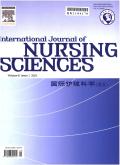Using an aromatherapy intervention with Citrus bergamia (bergamot) essential oil in adults in treatment for substance use disorder: A randomized controlled trial
IF 3.1
3区 医学
Q1 NURSING
引用次数: 0
Abstract
Objectives
This study had two aims. Aim one is to evaluate the feasibility and acceptability of using an aroma-based, self-managed intervention for adults in outpatient treatment for substance use disorder. Aim two is to examine the effects of a Citrus bergamia (Bergamot) essential oil intervention on the variables of comfort, ease, and stress.
Methods
A randomized controlled trial was conducted (NCT05660434). Adults in treatment for substance use disorder were randomized to either control group (standard care) (n = 55) or intervention group (standard care plus Citrus bergamia [Bergamot] essential oil intervention), three times a day for seven days (n = 45). All data were analyzed using an intention-to-treat method. Outcomes were measured using valid and reliable measures.
Results
One hundred participants were recruited over 11 months. Reasons for non or limited participation included feeling overwhelmed by the demands of treatment and everyday living. Data analysis showed psychological variable improvement with a significant increase in ease reported (P = 0.022) and DASS-21 subscales for depression (P = 0.007) and anxiety (P = 0.013) in the intervention group. Post-satisfaction survey results were positive, with overall enjoyment, perception of the aroma, and intention to continue to use the aroma inhaler post-trial, which was high.
Conclusions
Results from this study provide data to support the feasibility and acceptability of using essential oil via inhalation to help this population. Findings from this study will inform a more extensive study designed to examine effects within and between groups using a placebo.
使用香薰干预柑橘佛手柑精油在成人治疗物质使用障碍:一项随机对照试验
本研究有两个目的。目的一是评估的可行性和可接受性,使用芳香为基础,自我管理干预成人门诊治疗物质使用障碍。目的二是检查柑橘佛手柑(佛手柑)精油干预对舒适,缓解和压力变量的影响。方法采用随机对照试验(NCT05660434)。接受药物使用障碍治疗的成年人被随机分为对照组(标准治疗)(n = 55)或干预组(标准治疗加佛手柑精油干预),每天三次,持续7天(n = 45)。所有数据均采用意向治疗法进行分析。采用有效可靠的测量方法测量结果。结果在11个月内招募了100名参与者。不参与或有限参与的原因包括对治疗和日常生活的需求感到不堪重负。数据分析显示,干预组心理变量有所改善,缓解报告(P = 0.022)和抑郁(P = 0.007)、焦虑(P = 0.013)的DASS-21量表显著增加。后满意度调查结果是积极的,总体享受,对香气的感知,以及在试验后继续使用香气吸入器的意愿,这是很高的。结论本研究结果提供了数据,支持通过吸入精油来帮助这一人群的可行性和可接受性。这项研究的结果将为一项更广泛的研究提供信息,该研究旨在检查使用安慰剂的组内和组间的效果。
本文章由计算机程序翻译,如有差异,请以英文原文为准。
求助全文
约1分钟内获得全文
求助全文
来源期刊

International Journal of Nursing Sciences
Nursing-Nursing (all)
CiteScore
6.10
自引率
2.60%
发文量
408
审稿时长
25 days
期刊介绍:
This journal aims to promote excellence in nursing and health care through the dissemination of the latest, evidence-based, peer-reviewed clinical information and original research, providing an international platform for exchanging knowledge, research findings and nursing practice experience. This journal covers a wide range of nursing topics such as advanced nursing practice, bio-psychosocial issues related to health, cultural perspectives, lifestyle change as a component of health promotion, chronic disease, including end-of-life care, family care giving. IJNSS publishes four issues per year in Jan/Apr/Jul/Oct. IJNSS intended readership includes practicing nurses in all spheres and at all levels who are committed to advancing practice and professional development on the basis of new knowledge and evidence; managers and senior members of the nursing; nurse educators and nursing students etc. IJNSS seeks to enrich insight into clinical need and the implications for nursing intervention and models of service delivery. Contributions are welcomed from other health professions on issues that have a direct impact on nursing practice.
 求助内容:
求助内容: 应助结果提醒方式:
应助结果提醒方式:


